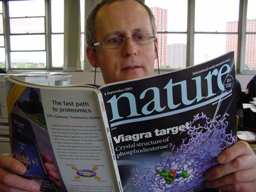 Geoscientist 22.01 February 2012
Geoscientist 22.01 February 2012
In October last year, the go-ahead was finally given to a new gold mine in Scotland. This occasioned great media interest - and surprise among people living beyond the villages and farms around Cononish, near Tyndrum (where they have been arguing its pros and cons for decades). Mining company Scotgold Resources now estimates that £50m of gold may eventually be recovered from them thar banks and braes of the Loch Lomond and Trossachs National Park.
The timing of this is clearly not unrelated to rocketing prices during a time of financial recession. But gold is far from the only metal shooting up in value. At the other end of the UK, at Hemerdon near Plymouth, Wolf Minerals will soon exploit one of the largest tungsten (and tin) resources in the western world. This new mine will provide security of supply for the UK, making it a net exporter by 2014 and directly creating 230 jobs. Metal mining is coming back home.
Both ends of the tungsten market are, as with so many strategic elements, dominated today by China. China dominates production; and not so long ago it flooded the market and prices tumbled. Now, China now consumes much of its output, forcing global prices sky-high. Hemerdon, producing 3000 tonnes per year, will be one of the biggest tungsten mines in the world, and help to restore some balance.
Tungsten is an example of a “strategic metal”, a shortage of which could prove economically and politically sensitive - especially when reserves are concentrated in just one or two countries. In our feature this week,
Mark Tyrer explores emerging concerns over the supply of strategic metals and minerals - a concern which industry (and the Society) are attempting to bring to the attention of politicians in meetings and briefing notes.
Governments need to wake up to this. China enjoys many advantages, including immense mineral wealth; but another is that, uniquely, it is more or less run by engineers and scientists – rather than lawyers and professional politicians. Technocrats make up most of the Chinese politburo, and they are quick to grasp strategic scientific arguments. In a world where increasingly, China keeps all the strategic minerals that it produces for itself, the rest of the world must be on its mettle - and look to its rocks.
TED NIELD
Editor